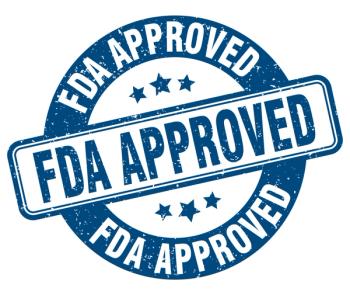
- Drug Topics July 2020
- Volume 164
- Issue 7
Selpercatinib for NSCLC and Thyroid Cancer With RET Mutations or Fusions
On May 8, 2020, the FDA granted accelerated approval to selpercatinib (Retevmo; Eli Lilly and Company).
On May 8, 2020, the FDA granted accelerated approval to selpercatinib (Retevmo; Eli Lilly and Company).1 Selpercatinib is now indicated for (1) adults with metastatic RET fusion–positive non–small cell lung cancer (NSCLC), (2) adults and pediatric patients 12 years or older with advanced or metastatic RET-mutant medullary thyroid cancer (MTC) who require systemic therapy, and (3) adults and pediatric patients 12 years and older with advanced or metastatic RET-fusion MTC who require systemic therapy and who are refractory to radioactive iodine. Selpercatinib inhibits wild-type RET and multiple mutated forms of RET as well as VEGFR1/3 to ultimately inhibit tumor cell proliferation promoted by these pathways.2
EFFICACY
Accelerated approval of selpercatinib stemmed from results of the multicenter phase 1/2 LIBRETTO-001 trial (NCT03157128), which evaluated selpercatinib in patients with RET-driven cancer.3 The trial enrolled both treatment-naïve and heavily treated patients with solid tumors, including those with RET fusion–positive NSCLC (n=144) and MTC (n=27) and RET-mutant MTC (n=143). The primary end point of overall response rate (ORR; complete and partial responses) was 85% (95% CI, 70-94) of patients with treatment-naïve RET fusion–positive NSCLC; in treatment-experienced patients, the ORR was 64% (95% CI, 54-73). The ORR was 73% (95% CI, 62-82) in treatment-naïve patients with RET-mutant MTC versus 69% (95% CI, 55-81) in treatment-experienced patients. In those with RET fusion–positive MTC, the ORR was 100% (95% CI, 63-100) in treatmentnaïve patients and 79% (95% CI, 54-94) in experienced patients. The median duration of response has not yet been reached for most of these patients. Selpercatinib is also effective in patients with RET fusion–positive NSCLC and measurable brain metastases, with a reported central nervous system ORR of 91% and a duration of response of 6 months or longer.
SAFETY
The most common adverse reactions (≥25%) were dry mouth, diarrhea, hypertension, fatigue, edema, rash, and constipation. Common laboratory value abnormalities (≥25%) included level increases in aspartate aminotransferase, alanine aminotransferase, glucose, alkaline phosphatase, cholesterol, and creatinine and decreases in leukocytes, albumin, calcium, platelets, and sodium.2 Because of these adverse events, routine monitoring of liver function enzymes at baseline, every 2 weeks during the first 3 months, and then monthly thereafter, and monitoring of blood pressure at baseline, after week 1, and monthly thereafter are recommended. Patients are also at risk for QTc prolongation, so monitoring of electrolyte and thyroid stimulating function levels at baseline and periodically is also recommended. Additionally, because selpercatinib can inhibit VEGFR, hemorrhage and impaired wound healing can occur. Drug-drug interactions can occur with acid-reducing drugs, strong and moderate cytochrome P450 (CYP) 3A4 inhibitors and inducers, and CYP2C8 and CYP3A substrates. Practitioners should avoid each of these if possible; otherwise, they may need to dose-adjust.
DOSING AND COST
Dosing is based on weight; for patients 50 kg or greater, the dose is 160 mg by mouth daily. For those less than 50 kg, the dose is 120 mg by mouth daily.2 Patients may take selpercatinib with or without food. Dose adjustments are recommended for severe hepatic impairment, adverse drug reactions, and some drug interactions.4 A 40-mg capsule costs $137.33, and an 80-mg capsule costs $206.4
References
1. FDA approves selpercatinib for lung and thyroid cancers with RET gene mutations or fusions. News release. FDA. May 8, 2020. Updated May 11, 2020. Accessed June 2, 2020. https://www.fda.gov/drugs/drug-approvals-and-databases/fda-approves-selpercatinib-lung-and-thyroid-cancers-ret-gene-mutationsor-fusions
2. Retevmo. Package insert. Eli Lilly and Company; 2020. Accessed June 2, 2020. https://www.accessdata.fda. gov/drugsatfda_docs/label/2020/213246s000lbl.pdf
3. Lilly receives U.S. FDA approval for Retevmo (selpercatinib), the rst therapy speci cally for patients with advanced RET-driven lung and thyroid cancers. News release. Eli Lilly and Co. May 8, 2020. Accessed June 2, 2020. http://lilly.mediaroom.com/index. php?s=9042&item=138045
4. Wolters Kluwer-Health Inc. Lexicomp. Lexi-Drugs/ Selpercatinib. Accessed June 2, 2020.
Articles in this issue
over 5 years ago
Go to Bat for Patients in Needover 5 years ago
UMass Memorial Provides Model for Curbside Medication Deliveryover 5 years ago
Microbiome Research Calls for Due Diligence in Pharmacyover 5 years ago
COVID-19 Testing Is Not an Automatic Choice for Pharmacistsover 5 years ago
Psychedelic Medicines for Pain Go Mainstreamover 5 years ago
Pharmacies Must Prepare for a COVID-19 Vaccineover 5 years ago
Pharmacists Are Key Players in Asthma Managementover 5 years ago
Addressing Diabetes Management Disparities in Minority ChildrenNewsletter
Pharmacy practice is always changing. Stay ahead of the curve with the Drug Topics newsletter and get the latest drug information, industry trends, and patient care tips.























